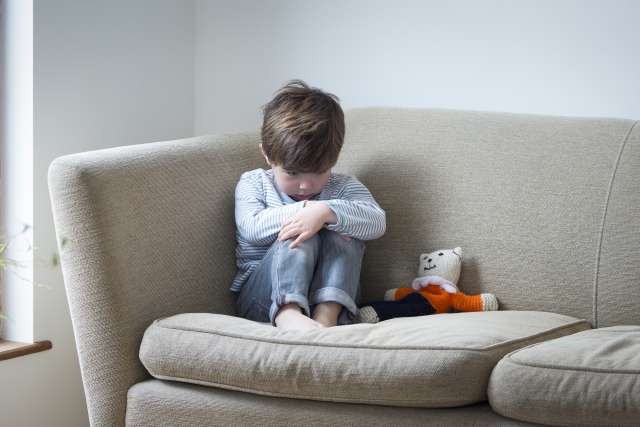Amid mounting evidence of the corrosive effect that adverse childhood experiences (ACEs) have on mental, physical and social outcomes later in life, the importance of pediatricians delivering what is known as “trauma-informed care” has become increasingly clear, say UCLA Health experts in the field.
Seminal research published in 1998 links ACEs to chronic health problems, mental illness and substance use in adolescence and adulthood, as well as negative impacts on education and job potential. The Adverse Childhood Experiences Study, published by researchers from the Centers for Disease Control and Prevention (CDC) and Kaiser Permanente, found that 61% of adults reported that by age 18 they had at least one type of ACE — examples include experiencing violence, abuse or neglect; witnessing violence in the home or community; having a family member attempt or die by suicide; and growing up in a household with substance use problems, mental health problems or instability due to parental separation or imprisonment.
Nearly one-in-six reported experiencing four or more ACEs, and these individuals had a four-to-12-fold increased risk for alcoholism, drug use, depression and suicide attempts, among other negative outcomes.
“None of this was surprising to pediatricians,” says Moira Szilagyi, MD, PhD, division chief of developmental/behavioral pediatrics at UCLA Mattel Children’s Hospital and Peter Shapiro Term Chair for the Promotion of Child Developmental and Behavioral Health. “But to see all of the data was really a clarion call to a lot of us.
"Pediatricians have to be the ones to identify children who are at risk and prevent this trajectory.”
Advancing trauma-informed care
The issue is of such significance that the California Department of Health Care Services (DHCS) awarded $41.5 million to UCLA in 2021 to form a multi-campus entity — the UCLA/UCSF ACEs Aware Family Resilience Network (UCAAN) — to advance the field of ACE science and trauma-informed care by implementing the State of California’s ACEs Aware initiative, which offers providers training, screening tools, clinical protocols and payment to screen children and adults for ACEs.
That funding has been extended through 2025, for a total of more than $150 million, with nearly half allocated for academic pilot projects and community grants supporting trauma-informed care for children and adults impacted by toxic stress.
The UCLA-UC San Francisco collaboration leverages the academic and clinical resources of both institutions to provide subject-matter expertise and lead pilot projects to investigate ACE-associated health conditions. In addition, the UCLA Prevention Center of Excellence has a central role to advance the ACEs Aware curriculum and deliver training and education for health care teams.
The initiative recently announced a major milestone: More than 1 million Medi-Cal members — children and adults — have been screened for ACEs and assessed for risk of toxic stress. Since 2019, nearly 30,000 clinicians and others in health care settings have been trained to screen for ACEs.
While ACEs affect all communities, studies show there is a higher prevalence among individuals from systemically overlooked communities, such as people who have experiences with the justice and child welfare systems. Racism and discrimination are risk factors of toxic stress and have long-term health impacts, but experts caution against focusing too much on select populations.
“If you over-screen one population, that leads people to wrongly associate ACEs only with certain groups,” says Shannon Thyne, MD, chief of pediatrics at Olive View-UCLA Medical Center, director of pediatrics for the L.A. County Department of Health Services and co-principal investigator of UCAAN. “While it is true that ACEs may be higher in some communities, anyone can experience adversity, and it is not visible from the outside.”
Universal screening, which the ACEs Aware initiative advocates, “provides the best opportunity to avoid bias that could lead to inadequate care.”
The growing science on early brain development and the effects of stress on the body since that 1998 study have only underscored those findings. “Trauma can change the physiology of children and adolescents, and the impact of trauma can last across the lifespan,” says Christine Thang, MD, assistant clinical professor of pediatrics.
Not every individual who experiences ACEs is destined to poor health outcomes, especially when there are protective factors in place, Dr. Thang points out, “but being aware of and attuned to trauma-informed care allows us to identify and recognize the impacts of trauma and respond accordingly. The mental health crisis in our country makes the trauma-informed approach even more necessary.”
In the past, when children presented with sleep issues or challenging behaviors, for example, pediatricians tended to counsel parents on sleep hygiene, timeouts, distraction techniques and other strategies, and potentially make a developmental referral. Trauma-informed care encourages providers to understand the context of their patients’ lives — both the risk factors and the resilience-promoting factors — and to first determine if symptoms are related to any adverse exposures.
“I teach trainees to think about trauma and traumatic stress when they see children with behavioral challenges or adolescents struggling in the home or at school,” says Dr. Thang, who is director of education and training for UCANN. “Difficulties with sleep at home or challenging behaviors thought to be ADHD in the school might be the result of trauma.
"We teach our trainees to consider the spectrum of reactions that may include a variety of responses including physical, mental, behavioral, and developmental symptoms.”
Screening for ACEs opens the window to explore and evaluate potential issues more fully. “It allows you to dig a little deeper into what’s going on for an individual patient and determine what strategies you can employ to help them,” Dr. Thyne says. “A lot of people have their ideas of what trauma-informed care is or what adversity is, but by putting a framework around what’s going on for an individual, providers have a better opportunity to respond in a more tailored way.”
A safe environment
Dr. Szilagyi, a UCANN pilot-project principal investigator, describes trauma-informed care as “family-centered, relational care that recognizes and responds to what has happened in the life of the family or the child and helps the parent and child recover.”
But getting children, or their parents, to reveal adverse experiences isn’t always easy. It requires a welcoming and nurturing environment in which patients and families feel safe to share intimate details of their lives with assurance that they will be treated with dignity, kindness and compassion.
“By adopting a trauma-informed care approach, we acknowledge that the work of serving our patients is inseparable from supporting them through their journey of personal growth, accepting patients’ whole selves without judgment and committing to responding in ways that support their journey toward growth and recovery from past trauma,” says Adam Schickedanz, MD, PhD, assistant professor of pediatrics, chair of the Adverse Childhood Experiences Committee of the American Academy of Pediatrics’ Southern California chapter and a UCANN pilot-project principal investigator
In addition, practicing trauma-informed care requires that health care providers acknowledge their own, at times, culpability in contributing to an atmosphere of mistrust for some patients.
“It is incumbent on us to recognize that many patients may have had traumatic experiences with the health care system, and we must work to create care experiences that don't recreate that trauma and that work to, first-and-foremost, help people feel safe as their full selves in medical spaces,” Dr. Schickedanz says.
“If patients can't feel safe because of how they are processing their past experiences of trauma, then often very little can be accomplished through their health care until they feel safe again.”
In working with families to help children heal from adverse experiences, Dr. Szilagyi advises pediatricians to focus on the three “R”s — provide reassurance; encourage routines; and help children develop regulation skills by building their emotional vocabulary and showing them ways they can cope.
In addition, she urges parents to contain their own emotions when around their children and to act as “emotional containers” in a way that helps to soothe children and calm their stress responses. She notes that resilience was once thought of as an inherited trait, but recent studies indicate it is developed through a safe, stable, nurturing and responsive caregiver.
The CDC estimates that such relationships can prevent ACEs and help children reach their full potential while eliminating as many as 1.9 million cases of heart disease and 21 million cases of depression.
“Children need love, validation and support,” Dr. Szilagyi says. “They need us to teach them and for us to hold things for them. When we can do that for them, they flourish.”
This article was written by Dan Gordon and UCLA Health staff.





